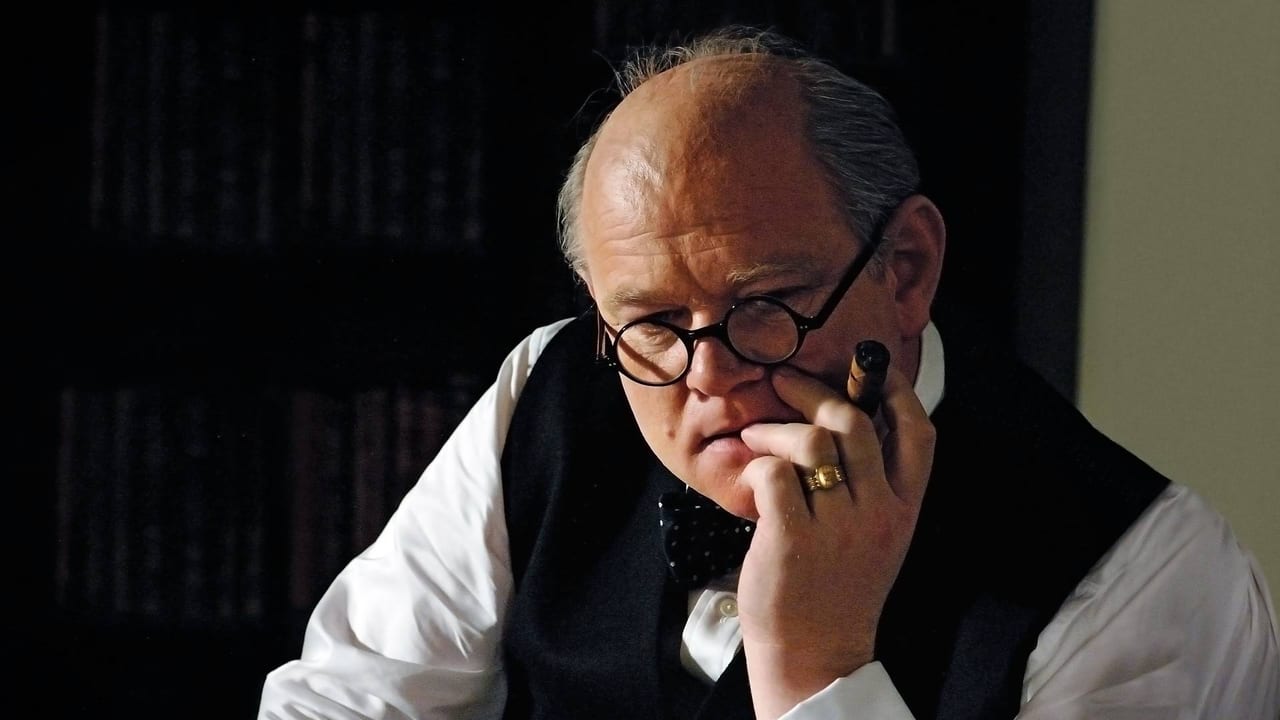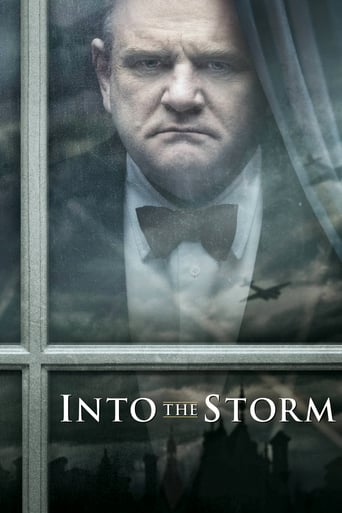

Masterful Movie
... View MoreI really wanted to like this movie. I feel terribly cynical trashing it, and that's why I'm giving it a middling 5. Actually, I'm giving it a 5 because there were some superb performances.
... View MoreA story that's too fascinating to pass by...
... View MoreYes, absolutely, there is fun to be had, as well as many, many things to go boom, all amid an atmospheric urban jungle.
... View MoreThis film explores an intriguing question: why did the people of Britain vote Labour in 1945, rejecting the man who had been their champion throughout the War? That man, Winston Churchill, is the central figure of the film and we are presented with many sides of his character and with flashbacks to his work as Prime Minister from the outbreak of war in 1939.I was very impressed by this film. Brendan Gleeson is excellent as Churchill, as is Janet McTear as his wife, Clemmie. The whole film is very well cast and the settings and period detail are used to great effect. The script by Hugh Whitmore is very good, ranging from the quietly intimate (presenting the Churchills' marriage), to the humorous, to the grand rhetoric of his epic wartime speeches. Thaddeus O'Sullivan directs the film with great skill, at times moving the story forward with dramatic urgency, and at others bringing out the emotion of a scene skilfully and effectively. Even familiar speeches of Churchill's, which suffer from over-familiarity, come across with real power.Britain was lucky to have had Churchill in its hour of need. He faced up to what the Nazis and the Fascists were doing and could see where appeasement policies would end up. History proved him right. After the fall of France, when Britain faced the might of Hitler's Reich alone, the rhetoric of Churchill inspired the people and urged them to fight on, despite every set-back. It would have been so easy to give in and settle for whatever terms Hitler would have offered. We owe a huge debt to Churchill for his determination and his tenacity. It is to the credit of this film that we feel warmth and sympathy for the man and gratitude for the leader.I am glad to see that this film has won many awards. It certainly deserves them.
... View More"The Gathering Storm" was a fantastic film and Albert Finney's performance in that movie was nothing short of remarkable. I'm not sure why he didn't star in the sequel, but even his outstanding talents might not have been enough to rescue this film."Into the Storm" film missed too many of the key dramatic moments in the Churchill narrative. Churchill learned of his ridiculous electoral defeat (shame on you, British voters of 1945!) at Potsdam, not while on vacation in France. The writers changed history needlessly, for Potsdam would have formed a much more dramatic framework in which to flashback from. Certainly far more so than the vacation in France. Heck, HBO might have even gotten Gary Sinise to reprise his masterful performance as Truman.Why was there no depiction of Churchill's attempt to warn Stalin of Hitler's looming invasion and Stalin's ignoring of said warning? And where is Churchill interacting with figures like Eisenhower and De Gaulle? Why was all of this omitted? The worst thing about this movie, however, was the omission of Churchill's immortal "Finest Hour" speech. Seriously, how could the writers and producers omit such an amazing and inspirational speech? I was looking forward to the scene of him delivering this speech but, alas, it never came. The producers also could have thrown in a scene of his address to Congress (by the way, what was with the actor playing FDR? He resembled FDR, but didn't even try to sound like him at all).This film was about one of the bravest and boldest men of all time, the man perhaps most responsible for the defeat of Nazism. He was a real hero. He may have been flawed personally, but heroism consists in the transcending of one's flaws in the achievement of great things. How did the producers of this movie manage to screw up such golden subject matter?
... View More"Into the Storm" is one of those films where the lead actor Brendan Gleeson plays wartime Prime Minister Winston Churchill as though he is that man, but all that talent goes to waste because this film is nothing more than a white-wash of history. Evidentally the creators of this movie were more concerned about not offending anyone than with creating a film that was thought provocative, profound and even controversial. As a result, the plot and the characters simply go through the motions like in the propaganda war films from the 1940s. But you can also excuse the corny propaganda reels because they were a product of their own time. But one cannot excuse "Into the Storm" especially considering that it was made in 2009 when more primary documents about this period were available to the public.Indeed, in my humble view, this film would have been so much better if it remained faithful to the historical record instead of portraying the Second World War much in the same way as grandpa wanted to see it. The real Winston Churchill, for example, may have been a genius, but he had a very dark side which was completely overlooked in this movie. Churchill knew in April 1939 that Hitler would go to war to escape from the economic troubles that Germany was facing at that time. Moreover, Chamberlain and Roosevelt were in large part responsible for causing the Second World War. They worked together in implementing the Tripartite Stabilization Agreement, the Anglo-American Trade Agreement and other measures which had the effect of reducing German exports. Since the Germans could no longer earn foreign exchange (with which to buy foodstuffs and raw materials) by exporting goods abroad, Hitler faced a situation where he would either have to impose a tough austerity program that would have caused massive unemployment and starved his people or he would have to obtain his foodstuffs and raw materials through territorial conquest. He chose the latter course. But once again, "Into the Storm" makes no reference to that side of the story. If it did, then this movie would have been a lot more interesting.Finally, I object to the way Franklin D. Roosevelt was portrayed in this film by Len Cariou. Cariou seems to have got the impression that Roosevelt was a plain spoken honest man, when he was in fact the complete opposite. Roosevelt played mind games with his staff, his foreign allies and with his enemies. Moreover, he was the mastermind behind economic warfare against Germany. Once again, this film can take any approach to the material that it likes. But I submit that the reality of what happened is so much more interesting than any of the white-wash that this movie has to offer."Into the Storm" is not the worst movie I have seen. But it is pretty bad. It has no imagination, it does not have a whole lot of intelligence and the creators lack the independent mindedness to portray the past in a new and original way.
... View MoreAs an history teacher whose bust of Churchill graces my classroom wall, I was looking forward with some trepidation, feeling that this would be another example of British film-makers dumbing down for their American cousins. And reading the comments here, it would appear with some reason. Churchill is supposed to come across as an humourless man with chunks of history taken out or exaggerated. However, I find this to be a study in resolution under unimaginable pressure. The war in Britain is presented with broad strokes, but such short episodes manage to convey the mythic times they present. Churchill is not seen to be infallible (at times he expresses gratitude for the war and a megalomania that cost his judgement so dear, whether at Gallipoli or with Norway) but this all the more makes one appreciate his achievement. This film is meant to have viewers come away with an understanding of what his leadership meant and why he was such a towering figure over the past century. Of course much is left undeveloped or left out, but then this was only 100 minutes long. For those who know Churchill intimately through history (including his own), I think you'll be gratified with many of the asides and intimations that may pass over the heads of others. If I have any quibbles, one would be the format. I'm not sure why the narrative goes back and forth after VE day and during the war. It adds nothing but in fact messes up the history needlessly- Churchill had been at Potsdam when news of his crushing election defeat came in, not on holiday in France. That why it was such a blow, and how he knew (as he is made to say here) that Stalin was shocked; if even Churchill could lose elections, better to dispense with them in his Eastern settlements. Churchill's role at Potsdam was crucial, not only in the final settlement with Germany, but in having the US agree with the dropping of the A bomb. Here is an example of his greatness in shaping our world completely erased only to have considerable dramatic licence made concerning his marriage, which was never as rough as is made out. But as a tribute to one of those rare Great Men who change the course of history (even rarer for being, in this case, for our lasting benefit), it makes one watch with back straightened and a lump in the throat. Sure, some scenes appear staged (as when he meets with young airmen about to do battle, inspiring him to come up with "Never in the field of human conflict..." on the spot) but then, Churchill lived by and through myths. With fine direction (it was produced, I noticed, by Ridley Scott!) and acting, I'm going to force my girlfriend now to sit and watch it with me. www.imperialflags.blogspot.com
... View More